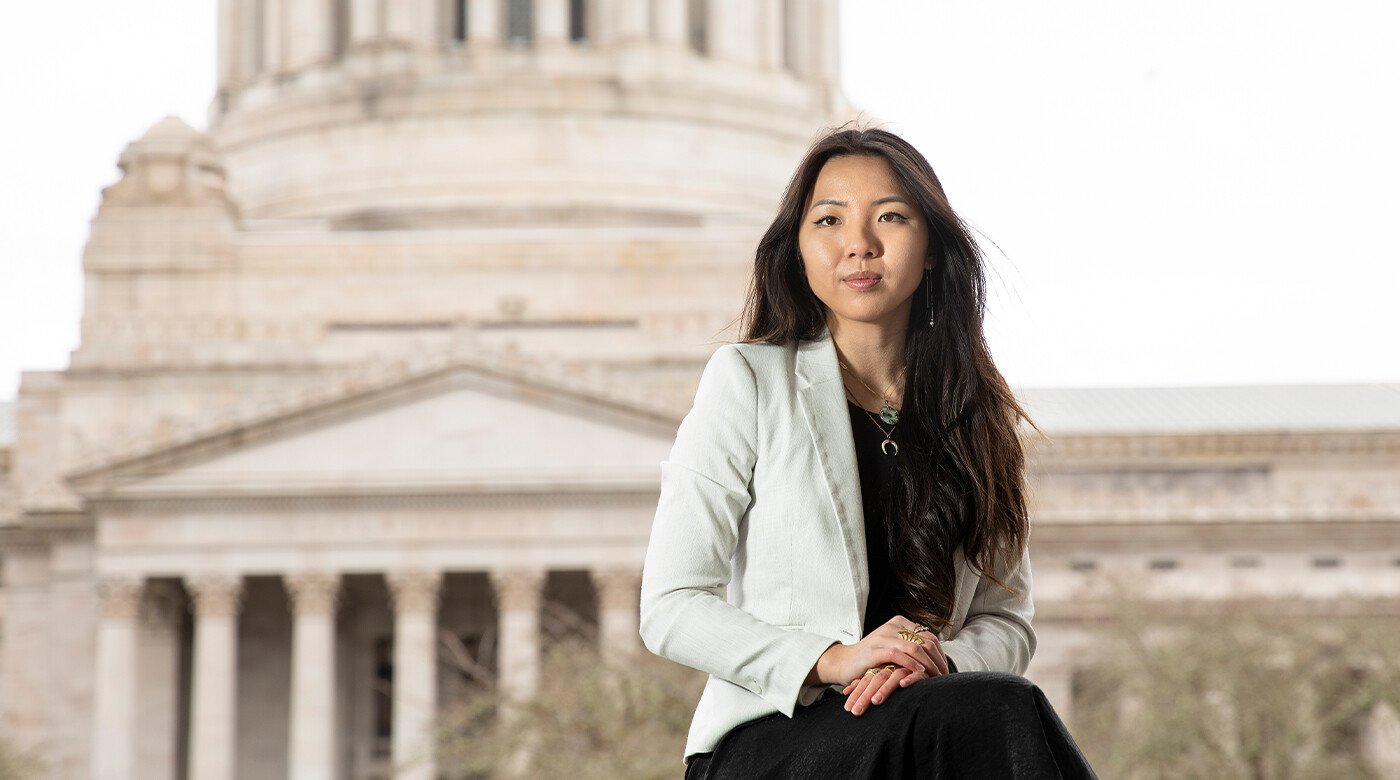Quan Huynh ’25 Discusses her Internship at the Washington State Senate

Image: Quan Huynh ‘25 at Washington State’s capitol building (PLU photo/Sy Bean)
By Grant Hoskins ’23
PLU Marketing & Communications Student Writer
Pacific Lutheran University Pre-Law Club President Quan Huynh ’25 unexpectedly stepped into the world of state government, with a bold new perspective.
A self-described political newcomer, Huynh proudly represents PLU in Olympia as an intern at the Washington State Senate. As a member of Sen. Manka Dhingra’s (D-45) office, Huynh actively participates in the legislative process by meeting with policy stakeholders and communicating with constituents.
Although the shift to professional life can challenge any college student, Huynh, who aspires to become a lawyer and uplift her community, serves as the president of PLU’s Pre-Law Club and is double majoring in political science and philosophy. She expanded more on her transition and the value of young people in government in a Q&A session.
Did you have any political or governmental experience before entering this internship?
Zero. This is my first time. I had no inclination to enter the political world. Right now, this internship is showing me how our legislature works, and there is value to that, even though it’s also confirmed I do not want to work in the political world. But, I am making meaningful connections where I can, I am learning things where I can, and I think that is all I can ask for.
What skills are you gaining from this experience?
I definitely feel like my professional development has gone up quite a bit in terms of what it means to work in a professional setting, and how to hold myself to a certain standard in a working way rather than an academic way. I definitely think that has been a bit of a struggle – shifting from being a student to “this is your job.” I’ve been trying to work on my time management skills, but it is a little rough.
What type of policy work does Senator Dhingra and your office work with?
She has a very wide variety of policy that she works with. A lot of her policy work right now has to do with mental and behavioral health, and sponsoring a bill from high school students on banning the pink tax (a term used for gender-based price differences applied to identical products). She’s also working on mental health competency, or forensic competency, so finding ways to improve our criminal justice system for people who have mental health issues and are being convicted of a crime, and making sure they are getting treatment as well as standing trial. So making sure that they are mentally competent enough to fully understand the grievousness of their crime and of their actions.
What tasks that you perform in your job were unexpected?
I really like taking constituent meetings, and I really like hearing people’s stories about what problems they face, because it impacts them in a more personal way, rather than just for monetary means.

What is the unique perspective that you bring to the internship?
I am an Asian American woman who grew up in Montana, which is a Republican state. I definitely think there are unique experiences there. I am the only daughter in a household with three brothers. There is a lot that can be derived from that experience. Coming out here to Washington, and meeting, speaking, and connecting with people who hold many different beliefs than I do, my thought processes have shifted a number of times. Being open to change is the key to everything, rather than just sticking to a particular mindset.
What’s the biggest lesson you’ve learned from your fellow interns and coworkers in Senator Dhingra’s office?
I have learned that there is more to the world than the simple black and white, right and wrong, and I think that is a harsh reality to come to terms with just because it is just hard to say if one thing is correct, or one thing is incorrect. I do still think that some truths are truer than others, and I hope that I can still see those truer things as my years go on.
What is the role of young people in state government, in your opinion?
More than anything, having more young people in the government sphere gives advocacy for the people in our generation and the generations close to our age. The role of young people brings in a type of freshness so that we can have a government that reflects the society it is supposed to be representing, especially if we are supposed to change with the times and not just stay true to tradition.
What are your future aspirations after college, and do you feel like they have been shaped by this experience?
My goal before starting the internship was to go to law school, but I do not have anything more concrete beyond getting my JD. I do not want to limit myself to one single pathway when there are many different opportunities that may pop up along the way. I do not want to feel like I have worked so hard for a particular goal that I’m dismissing another opportunity because I wanted one certain thing. Hopefully working in public service of some kind or helping out in that way because a law degree is a very powerful thing, and it can help or harm depending on what you use it for.


